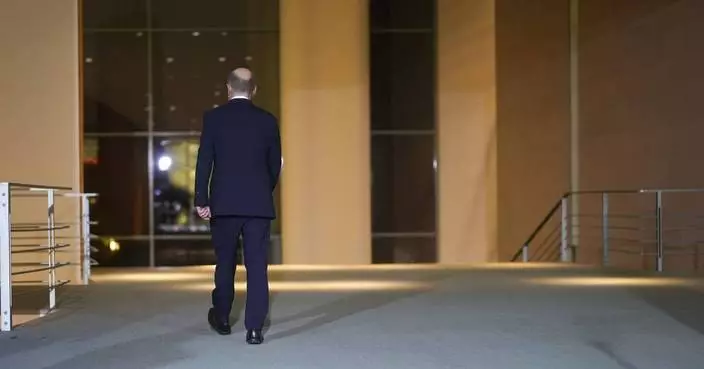ALEXANDRIA, Va. (AP) — A jury could begin deliberations as soon as Thursday on whether a Virginia-based military contractor bears responsibility for the abuse of detainees 20 years ago at Iraq's infamous Abu Ghraib prison.
The civil trial underway in U.S. District Court in Alexandria is the second this year involving allegations against Reston-based CACI, which supplied civilian interrogators to Abu Ghraib in 2003 and 2004 to supplement U.S. military efforts after the invasion of Iraq.
The first trial earlier this year ended in a mistrial with a hung jury that could not agree on whether CACI was liable.
The prison abuse scandal at Abu Ghraib shocked the world's conscience two decades ago after photos became public showing naked, abused inmates forced into humiliating poses.
Military police who were seen in the photos smiling and laughing as they directed the abuse were convicted in military courts-martial. But none of the civilian interrogators from CACI ever faced criminal charges, even though military investigations concluded that several CACI interrogators had engaged in wrongdoing.
The current lawsuit, filed by three former Abu Ghraib detainees, alleges that CACI interrogators contributed to their mistreatment by conspiring with military police to “soften up” detainees for questioning by subjecting them to abuse that included beatings, sexual abuse, forced nudity and dog attacks.
The trial earlier this year was the first time a U.S. jury heard claims brought by Abu Ghraib survivors. It came after 15 years of legal wrangling and multiple appeals that saw the case thrown out, only to be revived on multiple occasions by a federal appeals court.
CACI maintains, as it has from the outset, that it did nothing wrong. It does not deny that some detainees were horribly mistreated, though it has sought to cast doubt on whether the three plaintiffs in this case have been truthful about the specific abuse they have claimed.
But CACI says its employees had nothing to do with the abuse. And they contend that any isolated misconduct by its employees is actually the responsibility of the Army, which CACI contends had complete supervision and control over the civilians it supplied to the war effort.
CACI sought again this week to have the case tossed out of court, arguing in its filings that the plaintiffs “have not presented evidence, nor maintain any claims that CACI personnel directly mistreated them. Instead, Plaintiffs seek to hold CACI vicariously liable for injuries inflicted by others.”
Lawyers for the plaintiffs have said that CACI's contract with the Army, as well as the Army Field Manual, make clear that CACI is responsible for overseeing its own workers.
U.S. District Judge Leonie Brinkema, though, has allowed the case to go forward. Closing arguments are expected on Thursday.

FILE - This courtroom sketch depicts a former detainee at Abu Ghraib prison, Salah Al-Ejaili, foreground with glasses, at the trial of CACI, a Virginia-based military contractor who is accused of contributing to the abuse and torture of detainees at Abu Ghraib, in U.S. District Court in Alexandria, Va., April 16, 2024. (Dana Verkouteren via AP, File)
JERUSALEM (AP) — Israel’s parliament passed a law early Thursday that would allow it to deport family members of Palestinian attackers, including the country’s own citizens, to the war-ravaged Gaza Strip or other locations.
The law, which was championed by members of Prime Minister Benjamin Netanyahu's Likud party and his far-right allies, passed with a 61-41 vote. But legal experts said that any attempt to implement it would likely lead to it being struck down by Israeli courts.
It would apply to Palestinian citizens of Israel and residents of annexed east Jerusalem who knew about their family members' attacks beforehand or who “express support or identification with the act of terrorism.”
They would be deported, either to the Gaza Strip or another location, for a period of seven to 20 years. The Israel-Hamas war is still raging in Gaza, where tens of thousands have been killed and most of the population has been internally displaced, often multiple times.
It was unclear if it would apply in the occupied West Bank, where Israel already has a long-standing policy of demolishing the family homes of attackers. Palestinians have carried out scores of stabbing, shooting and car-ramming attacks against Israelis in recent years.
Oded Feller, a legal adviser to the Association for Civil Rights in Israel, dismissed the law as “populist nonsense.” He said it was unlikely to be applied, because there is no legal way for the Interior Ministry to send an Israeli citizen to another country or to Gaza.
His organization doesn't plan to challenge the law unless authorities try to enforce it, in which case he expects any court challenge to succeed.
Eran Shamir-Borer, a senior researcher at the Israel Democracy Institute and a former international law expert for the Israeli military, agreed that the law was likely to be struck down by the Supreme Court.
“The bottom line is this is completely nonconstitutional and a clear conflict to Israel’s core values,” Shamir-Borer said.
Israel captured Gaza, the West Bank and east Jerusalem in the 1967 Middle East war — territories the Palestinians want for their future state. It withdrew settlers and soldiers from Gaza in 2005, but has reoccupied parts of the territory since Hamas' attack on Oct. 7, 2023 triggered the war.
Israel annexed east Jerusalem in a move not recognized by most of the international community. Palestinians there have permanent residency and are allowed to apply for citizenship, but most choose not to, and those who do face a series of obstacles.
Palestinians living in Israel make up around 20% of the country's population. They have citizenship and the right to vote but face widespread discrimination. Many also have close family ties to those in the territories and most sympathize with the Palestinian cause.
Melanie Lidman reported from Tel Aviv, Israel. Tia Goldenberg contributed to this report from Tel Aviv.
Follow AP’s war coverage at https://apnews.com/hub/israel-hamas-war

Israeli Prime Minister Benjamin Netanyahu, center, speaks to Defense Minister Yoav Gallant, left, at the opening of the 25th Knesset session marking the anniversary of the "Iron Swords" war, in Jerusalem, Monday, Oct. 28, 2024. (Debbie Hill/Pool Photo via AP)

Israeli Prime Minister Benjamin Netanyahu, center, flanked by Defense Minister Yoav Gallant, second from left, attends at the opening of the 25th Knesset session marking the anniversary of the "Iron Swords" war, in Jerusalem, Monday, Oct. 28, 2024. (Debbie Hill/Pool Photo via AP)

Israeli Prime Minister Benjamin Netanyahu speaks at the opening of the 25th Knesset session marking the anniversary of the "Iron Swords" war, in Jerusalem, Monday, Oct. 28, 2024. (Debbie Hill/Pool Photo via AP)













